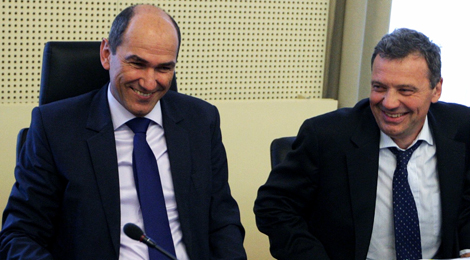NEWS
Prime Minister Janez Janša calls for reason and constructive fiscal regulation
The Prime Minister of the Republic of Slovenia, Janez Janša, today attended the Economic and Social Council session, where the social partners discussed the intervention measures associated with the revised budget.
In his introduction at the Economic and Social Council session, the Prime Minister explained that the Government had proposed a set of measures whose main objective was "to contribute to balancing the fiscal situation in the long term, and to adopt measures that would equitably distribute their burdens as fairly as possible". In his view, the measures and the approach taken concerning the adjustment to the fiscal situation, proposed to the social partners today, were more or less "balanced and equitable regarding both the expenditure and income sides of the budget".
The Prime Minister explained that the Government is focused on searching for solutions that ease the burden on the economy, launch investments and create new jobs in order to put the foundations in place for the country's welfare. He also stressed that, in the event that the measures are not adopted now, they should be proposed by the following Government, and, failing that, by some other authority. He further explained that the Government respected the different perspectives of the various social partners; however, it is his wish that negotiations are held on the measures and common solutions/adjustments sought before strike committees are established and strikes announced.
The Prime Minister pointed out that the Government had today adopted a revised budget proposal and a decision allowing the Government or the Government coalition to put forward relevant amendments to the revised budget proposal for as long as possible. He further stressed that all calls demanding the postponement of a decision on the revised budget would have direct financial consequences. "Slovenia has a budget which is not only unrealistic but also non-operational; this is due to a wide gap between its contents and the resources available," he stressed. The Prime Minister added that "every day that passes without an operational budget is costly for the state and may lead to losses amounting to millions of euros each week as a result. The sooner we get an operational budget, the better for the intended savings and milder austerity cuts". He also appealed to all those participating in the discussion to embrace pragmatism since there was not much time left.
The Prime Minister then tackled the issue of value added tax. In his view, most European countries had not in fact resorted to this measure in dealing with the consequences of the crisis, as is often falsely cited; this solution was only sought when other measures proved insufficient. "We all know that raising this tax may, beside generating positive results, also have negative implications, not only for the consumer – who has to pay more – but also for the economy, transport, and the like," the Prime Minister observed and added that the effects brought about by the increase to value added tax may easily be neutralised. "In terms of meeting the macro-fiscal objectives, this may be a possible measure; however, it would be unwise in the first place to resort to and/or only to this measure," the Prime Minister pointed out, adding that it was by no means certain that Slovenia would not be obliged to accept an increase in this tax in the near future; he further pointed out that "doing this first would mean putting off the problem". The Prime Minister expressed his hope that the situation would not deteriorate to that extent, but warned that such a measure could not be entirely discounted in the future.
The Prime Minister then called attention to the fact that European countries were led by the governments of three different political persuasions, and that these countries had implemented measures similar in nature to those proposed by the Slovenian Government. According to the Slovenian Prime Minister, this "is telling of the fact that Slovenia forms part of a particular area with a similar crisis situation meaning that 'reinventing the wheel' and quarrelling about the solutions is not necessary in consideration of the milieu to which we belong and of some of the solutions already used there".
"We are talking about a situation where many of the difficult issues that lie ahead can be resolved in a relatively moderate manner: our proposals are not drastic. Comparisons between the measures proposed by the Slovenian Government and the measures implemented by comparable European countries (in terms of development) with relevant macro-economic performance indicators reveal that more severe and rigorous measures have been adopted practically everywhere – particularly in the public sector – and that there is no single example to prove that the aforementioned problems could be overcome by means of a bypass," the Prime Minister explained.





